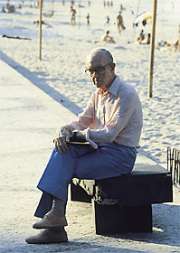Pagina: 2 : 1
A împlini 70 de ani
: Vol. MAȘINA LUMII și alte poeme
Poezie 2018-07-06 (4961 afişări)
A iubi – 105
: Vol. MAȘINA LUMII și alte poeme
Poezie 2018-07-03 (4701 afişări)
A-l cunoaște pe Jorge de Lima
: Vol. MAȘINA LUMII și alte poeme 2012
Poezie 2018-04-16 (4899 afişări)
Absență
: Vol. MAȘINA LUMII și alte poeme 2012
Poezie 2018-04-03 (4979 afişări)
Agasare
: Vol. MAȘINA LUMII și alte poeme
Poezie 2018-07-06 (4883 afişări)
Amintirea lumii de demult
: Vol. MAȘINA LUMII și alte poeme
Poezie 2018-06-30 (4755 afişări)
Amor, straniu semnal
: Vol. MAȘINA LUMII și alte poeme 2012
Poezie 2018-03-29 (4997 afişări)
Anul trecut
: Vol. MAȘINA LUMII și alte poeme 2012
Poezie 2018-04-16 (4909 afişări)
Aristocrație
: Vol. MAȘINA LUMII și alte poeme 2012
Poezie 2018-03-25 (4740 afişări)
Aspirație
: Vol. MAȘINA LUMII și alte poeme 2012
Poezie 2018-07-02 (4725 afişări)
Atelier iritat
: Vol. MAȘINA LUMII și alte poeme 2012
Poezie 2018-03-31 (4894 afişări)
Cadril
: Vol. MAȘINA LUMII și alte poeme 2012
Poezie 2018-04-11 (5227 afişări)
Camera în dezordine
: Vol. MAȘINA LUMII și alte poeme 2012
Poezie 2018-03-26 (4886 afişări)
Câmp cu flori
:
Poezie 2007-10-31 (9735 afişări)
Cântec spongios
: Vol. MAȘINA LUMII și alte poeme 2012
Poezie 2018-03-31 (4975 afişări)
Casa timpului pierdut
: Vol. MAȘINA LUMII și alte poeme 2012
Poezie 2018-03-25 (4808 afişări)
Cealaltă ușă a plăcerii
: Vol. MAȘINA LUMII și alte poeme 2012
Poezie 2018-03-24 (5149 afişări)
Cercetare
: Vol. MAȘINA LUMII și alte poeme 2012
Poezie 2018-03-26 (4976 afişări)
Comuniune
: Vol. MAȘINA LUMII și alte poeme 2012
Poezie 2018-03-31 (4833 afişări)
Pagina: 2 : 1 |
|

|
|
|
|
Biografie Carlos Drummond de Andrade
Born October 31, 1902(1902-10-31)
Itabira, Minas Gerais, Brazil
Died August 17, 1987 (aged 84)
Rio de Janeiro
Occupation Poet
Nationality Brazilian
Literary movement Modernism
Carlos Drummond de Andrade (October 31, 1902 - August 17, 1987) was perhaps the most influential Brazilian poet of the 20th century. He has become something of a national poet; his poem "Cançăo Amiga" ("Friendly Song") was printed on the 50 cruzados note.
Drummond was born in Itabira, a mining village in Minas Gerais in southeastern Brazil. His parents were farmers of Portuguese ancestry (and remote Scottish ancestry). He went to a school of pharmacy in Belo Horizonte, but never worked as a pharmacist after graduation. He worked in government service for most of his life, eventually becoming director of history for the National Historical and Artistic Heritage Service of Brazil.
Though his earliest poems are formal and satirical, Drummond quickly adopted the new forms of Brazilian modernism that were evolving in the 1920s, incited by the work of Mário de Andrade (to whom he was not related). He adopted a Whitmanian free verse, mingling speech fluent in elegance and truth about the surrounding, many times quotidian, world, with a fluidity of thought.
One of Drummond's best-known poems is his hymn to an ordinary man, "José." It is a poem of desolation:
Key in hand,
you want to open the door -
there is no door. . .
The work of Carlos Drummond is generally divided into several segments, which appear very markedly in each of his books. But this is somewhat misleading, since even in the midst of his everyday poems or his socialist, politicized poems, there appear creations which can be easily incorporated into his later metaphysical canon, and none of these styles is completely free of the others. There is surely much metaphysical content in even his most political poems.
The most prominent of these later metaphysical poems is A Máquina do Mundo (The World's Machine). The poem deals with an anti-Faust referred to in the first person, who receives the visit of the aforementioned Machine, which stands for all possible knowledge, and the sum of the answers for all the questions which afflict men; in highly dramatic and baroque versification the poem develops only for the anonymous subject to decline the offer of endless knowledge and proceed his gloomy path in the solitary road. It takes the renaissance allegory of the Machine of the World from Portugal's most esteemed poet, Luís de Camões, more precisely, from a canto at the end of his epic masterpiece Os Lusíadas. There are also hints from Dante and the form is adapted from T. S. Eliot's dantesque passage in "Little Gidding."
Drummond is a favorite of American poets, a number of whom, including Mark Strand and Lloyd Schwartz, have translated him. Later writers and critics have sometimes credited his relationship with Elizabeth Bishop, his first English language translator, as influential for his American reception, but though she admired him Bishop claimed she barely knew him. In an interview with George Starbuck in 1977, she said:
I didn't know him at all. He's supposed to be very shy. I'm supposed to be very shy. We've met once — on the sidewalk at night. We had just come out of the same restaurant, and he kissed my hand politely when we were introduced.
|





